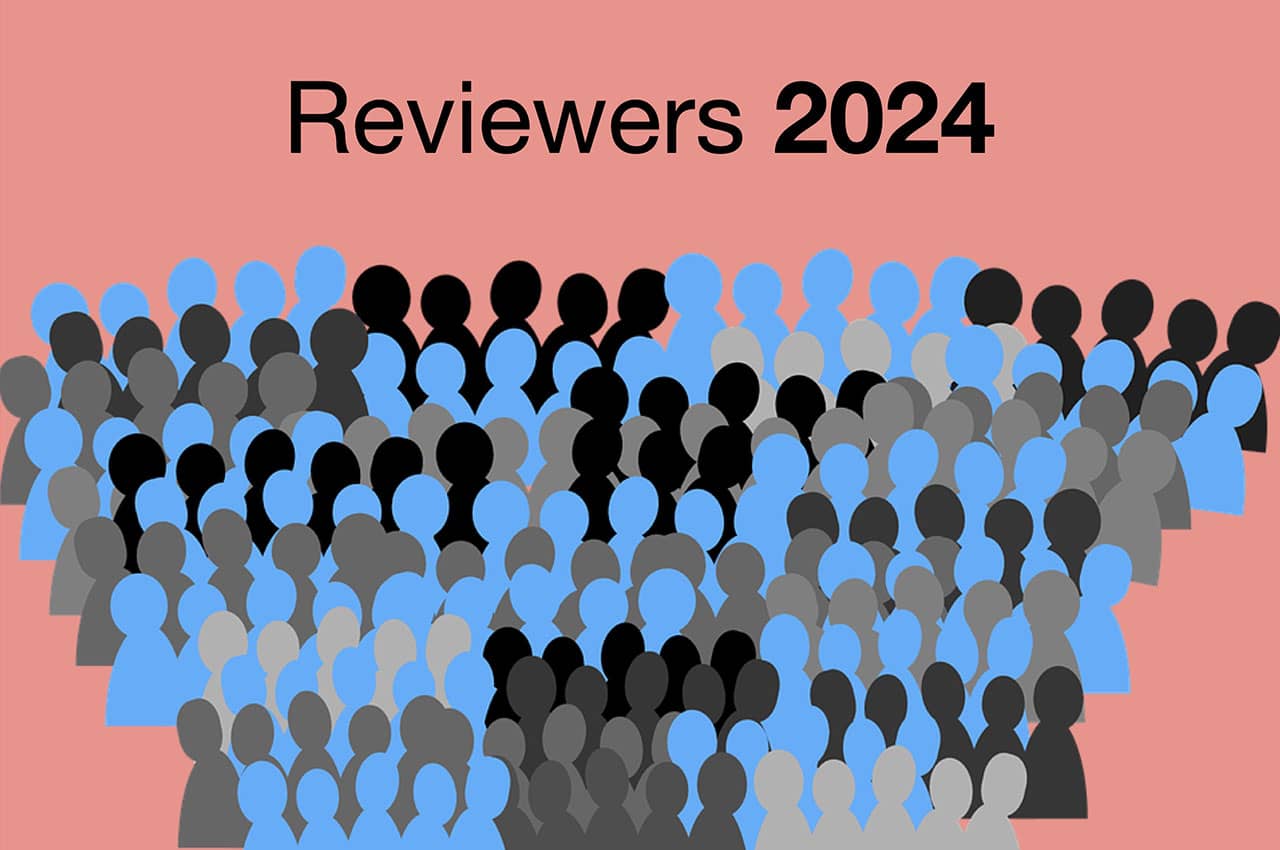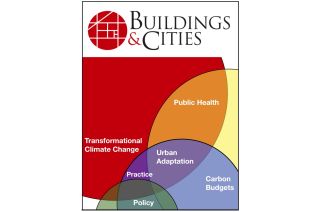
www.buildingsandcities.org/insights/news/2024-reviewers.html
2024 Reviewers

Buildings & Cities gratefully acknowledges and thanks our reviewers.
The Editors of Buildings & Cities would like to thank all our reviewers for their contribution and support during 2024. High-quality peer review is essential to the success of this journal and we greatly appreciate the dedication and efforts of all those who have contributed to this. Our reviewers have invested much thought, care and insights which have greatly benefitted authors. An enormous THANK YOU to this diverse community of scholars who help to maintain the highest standards for both Buildings & Cities and the wider community.
| Given Name | Family Name | Affiliation |
|---|---|---|
| Aggeliki | Aggeli | Aalborg University |
| Sanna | Ala-Mantila | University of Helsinki |
| Nicolas | Alaux | TU Graz |
| Or | Aleksandrowicz | Technion - Israel Institute of Technology |
| Serafeim | Alvanides | Northumbria |
| Deepak | Amaripadath | Arizona State University |
| Ana | Amorin-Maia | Basque Centre for Climate Change |
| Manisha | Anantharaman | Sciences Po |
| Jane | Anderson | ConstructionLCA |
| Maíra | André | University of Sydney |
| Gill | Armstrong | University of Technology Sydney, |
| Dicle | Aydin | Necmettin Erbakan University |
| Magda | Baborska-Narozny | Wrocław University of Science and Technology |
| Maria | Balouktsi | Aalborg University |
| Richard | Bärnthaler | University of Leeds |
| Burak | Belge | Mersin University |
| Thomas | Berker | Norwegian University of Science and Technology (NTNU) |
| Peter | Berrill | Leiden University |
| Anja | Bierwirth | Wuppertal Institute |
| Lina | Brand-Correa | York University, Toronto |
| Hannah | Budnitz | University of Oxford |
| Alessandro | Busa | University of Leicester |
| Noel | Cass | University of Leeds |
| Livia | Castro-Degrossi | University of Twente |
| Jenni | Cauvain | University of Nottingham |
| Paul | Chan | TU Delft |
| Vivien | Chow | Loughborough University |
| Andrea | Ciaramella | Politecnico Milano |
| Selçuk | Çidik | University College London |
| Ray | Cole | University of British Columbia |
| Thaisa | Comelli | University College London |
| Salmaan | Craig | UCLA |
| Robert | Crawford | University of Melbourne |
| Paul | Cureton | Lancaster University |
| Lyrian | Daniel | University of South Australia |
| Sarah | Darby | University of Oxford |
| Runa | Das | Royal Roads University |
| Rosie | Day | University of Birmingham |
| Martin | de Jong | Erasmus University Rotterdam |
| Sebastian | Dembski | University of Liverpool |
| Chrisna | du Plessis | School of Architecture |
| Katherine | Ellsworth-Krebs | University of Strathclyde |
| Rohinton | Emmanuel | Glasgow Caledonian University |
| Steve | Evans | University College London |
| Terence | Fell | Mälardalen University |
| Lauren | Ferguson | Harvard University |
| Maria Evangelina | Filippi | University of Bristol |
| Nuria | Forcada | Universitat Politècnica de Catalunya |
| Brian Hoole | Ford | University of Nottingham |
| Nicolas | Francart | Aalborg University |
| Stephanie | Gauthier | University of Southampton |
| Jeremy | Gibberd | CSIR |
| Isabel | Gil-García | Universidad a Distancia de Madrid |
| Aaron | Gillich | London South Bank University |
| Ian | Gough | London School of Economics & Political Science |
| Stuart David | Green | University of Reading |
| Monica | Guillen-Royo | CICERO Senter for klimaforskning, Oslo |
| Pernilla | Hagbert | KTH Royal Institute of Technology |
| Anders Rhiger | Hansen | Aalborg University Copenhagen |
| Saif | Haq | Texas Tech University |
| Ulla | Haverinen-Shaughnessy | University of Oulu |
| Runa T: | Hellwig | TU Berlin |
| Edgar | Hertwich | NTNU |
| Alexander | Hollberg | Chalmers University of Technology |
| Meghan | Holtan | University of Buffalo |
| Tianzhen | Hong | Lawrence Berkeley National Laboratory |
| Philippa | Howden-Chapman | University of Otago |
| Andreas | Huber | Brandenburgische Technische Universität Cottbus-Senftenberg |
| Gesche Margarethe | Huebner | University of Exeter |
| Satu | Huuhka | Tampere University |
| Mikko | Jalas | Aalto University |
| Patrick | James | University of Southampton |
| Michael | Jemtrud | McGill University |
| Shun | Kawakubo | Keio University |
| Willem | Korthals Altes | TU Delft |
| Matti | Kuittinen | Aalto University |
| Senja | Laakso | Tampere University |
| Adrian | Leaman | Building Use Studies |
| Joshua | Lee | Carnegie Mellon University |
| Mark | Levine | Lawrence Berkeley National Laboratory |
| Lu | Li | Syracuse Univeristy |
| Ang | Li | University of Melbourne |
| Dusan | Licina | École polytechnique fédérale de Lausanne |
| Kevin John | Lomas | Loughborough Univerisity |
| Martin | Loosemore | University of Technology Sydney |
| Sylvia | Lorek | SERI - Sustainable Europe Research Institute |
| Thomas | Lützkendorf | Karlsruhe Institute of Technology |
| Leslie | Mabon | Open University |
| Line | Madsen | Aalborg University (Copenhagen) |
| Tove | Malmqvist | KTH Stockholm |
| Alexandra | Malmström | University of Helsinki |
| Azhani | Manaf | Universiti Sains Islam Malaysia |
| Marianna | Marchesi | Cardiff University |
| Alessio | Mastrucci | International Institute for Applied Systems Analysis (IIASA) |
| Jenn | McArthur | Ryerson University |
| Sanaz | Memari | University of Sydney |
| Alessio | Miatto | CSIRO |
| Ana | Mijic | Imperial College London |
| Gerald | Mills | University College Dublin |
| Alice | Moncaster | University of the West of England |
| Trivess | Moore | RMIT University |
| Dominique | Moran | University of Birmingham |
| Brian | Muller | University of Colorado Boulder |
| Bernhard | Müller | TU Dresden |
| Amalka | Nawarathna | University of the West of England |
| David Angus | Ness | University of South Australia |
| Marialena | Nikolopoulou | University of Kent |
| Merve | Okkali Alsavada | University College London |
| Philip | Oldfield | University of New South Wales |
| Seyithan | Özer | Royal College of Art |
| Jiayu | Pan | University of Cambridge |
| Krista | Paulsen | Boise State University |
| David | Pearlmutter | Ben Gurion University of the Negev |
| Sofie | Pelsmakers | Tampere University |
| Carlos | Pereira | University of Lisbon |
| Bruno | Peuportier | Ecole des Mines de Paris |
| Gilles | Pinson | Sciences Po Bordeaux |
| Gary | Pivo | University of Arizona |
| Ani | Raiden | Nottingham Trent University |
| Rokia | Raslan | University College London |
| Freya Nygaard | Rasmussen | Norwegian University of Science and Technology (NTNU) |
| Rajan | Rawal | CEPT University |
| Katharina | Reindl | Lund University |
| Hilde | Remøy | TU Delft |
| Catarina | Ribeiro | Polytechnic Institute of Porto |
| Hom B. | Rijal | Tokyo City University |
| Ben | Roberts | Loughborough University |
| Caitlin | Robinson | University of Bristol |
| Myriam | Saadé | École des Ponts ParisTech |
| Marlyne | Sahakian | University of Geneva |
| Kerstin | Sailer | University College London |
| Ashraf | Salama | Northumbria University |
| Hannah | Saldert | University West |
| Agnese | Salvati | Polytechnic University of Catalonia |
| Caroline | Samson | City of Copenhagen |
| Siddharth | Sareen | University of Stavanger |
| Anindita | Sarkar | University of Delhi |
| Federico | Savini | University of Amsterdam |
| Joachim | Schleich | Fraunhofer Institute for Systems and Innovation Research ISI |
| Libby | Schweber | University of Reading |
| Marcel | Schweiker | RWTH Aachen University |
| Natalya | Sergeeva | University College London |
| Elizabeth | Shove | Lancaster University |
| Clive | Shrubsole | Public Health England |
| Stefan | Siedentop | Technical University of Dortmund |
| Katarina | Slavkovic | ETH Zurich |
| Marta | SMEKTAŁA | Wrocław University of Technology |
| Behzad | Sodagar | Circular Ecology |
| Philip | Steadman | University College London |
| André | Stephan | Université Catholique de Louvain |
| Fionn | Stevenson | Independent Scholar |
| Ana | Stojilovska | Centre for Social Sciences, Hungary |
| Jyrki | Tarpio | Tampere University |
| Jonathon | Taylor | Tampere University |
| Johannes | Thema | Wuppertal Institut |
| Liane | Thuvander | Chalmers University of Technology |
| Kathryn | Tomsho | Harvard University |
| Julia | Tuomimaa | University of Helsinki |
| Mari | Vaattovaara | University of Helsinki |
| Evert | van Beek | TU Delft |
| Gordon | Walker | Lancaster University |
| Elanor | Warwick | Clarion Housing Group |
| Nicola | Willand | RMIT University |
| Katherine | Willis | University of Plymouth |
| Mark | Winskel | University of Edinburgh |
| Yangang | Nottingham Trent University | |
| Jing | Xiong | University of Sydney |
| Carina | Zell-Ziegler | Öko-Institut |
| Karsten | Zimmerman | Technical University of Dortmund |
Latest Peer-Reviewed Journal Content
Acceptability of sufficiency consumption policies by Finnish households
E Nuorivaara & S Ahvenharju
Key factors for revitalising heritage buildings through adaptive reuse
É Savoie, J P Sapinski & A-M Laroche
Cooler streets for a cycleable city: assessing policy alignment
C Tang & J Bush
Understanding the embodied carbon credentials of modern methods of construction
R O'Hegarty, A McCarthy, J O'Hagan, T Thanapornpakornsin, S Raffoul & O Kinnane
The changing typology of urban apartment buildings in Aurinkolahti
S Meriläinen & A Tervo
Embodied climate impacts in urban development: a neighbourhood case study
S Sjökvist, N Francart, M Balouktsi & H Birgisdottir
Environmental effects of urban wind energy harvesting: a review
I Tsionas, M laguno-Munitxa & A Stephan
Office environment and employee differences by company health management certification
S Arata, M Sugiuchi, T Ikaga, Y Shiraishi, T Hayashi, S Ando & S Kawakubo
Spatiotemporal evaluation of embodied carbon in urban residential development
I Talvitie, A Amiri & S Junnila
Energy sufficiency in buildings and cities: current research, future directions [editorial]
M Sahakian, T Fawcett & S Darby
Sufficiency, consumption patterns and limits: a survey of French households
J Bouillet & C Grandclément
Health inequalities and indoor environments: research challenges and priorities [editorial]
M Ucci & A Mavrogianni
Operationalising energy sufficiency for low-carbon built environments in urbanising India
A B Lall & G Sethi
Promoting practices of sufficiency: reprogramming resource-intensive material arrangements
T H Christensen, L K Aagaard, A K Juvik, C Samson & K Gram-Hanssen
Culture change in the UK construction industry: an anthropological perspective
I Tellam
Are people willing to share living space? Household preferences in Finland
E Ruokamo, E Kylkilahti, M Lettenmeier & A Toppinen
Towards urban LCA: examining densification alternatives for a residential neighbourhood
M Moisio, E Salmio, T Kaasalainen, S Huuhka, A Räsänen, J Lahdensivu, M Leppänen & P Kuula
A population-level framework to estimate unequal exposure to indoor heat and air pollution
R Cole, C H Simpson, L Ferguson, P Symonds, J Taylor, C Heaviside, P Murage, H L Macintyre, S Hajat, A Mavrogianni & M Davies
Finnish glazed balconies: residents' experience, wellbeing and use
L Jegard, R Castaño-Rosa, S Kilpeläinen & S Pelsmakers
Modelling Nigerian residential dwellings: bottom-up approach and scenario analysis
C C Nwagwu, S Akin & E G Hertwich
Mapping municipal land policies: applications of flexible zoning for densification
V Götze, J-D Gerber & M Jehling
Energy sufficiency and recognition justice: a study of household consumption
A Guilbert
Linking housing, socio-demographic, environmental and mental health data at scale
P Symonds, C H Simpson, G Petrou, L Ferguson, A Mavrogianni & M Davies
Measuring health inequities due to housing characteristics
K Govertsen & M Kane
Provide or prevent? Exploring sufficiency imaginaries within Danish systems of provision
L K Aagaard & T H Christensen
Imagining sufficiency through collective changes as satisfiers
O Moynat & M Sahakian
US urban land-use reform: a strategy for energy sufficiency
Z M Subin, J Lombardi, R Muralidharan, J Korn, J Malik, T Pullen, M Wei & T Hong
Mapping supply chains for energy retrofit
F Wade & Y Han
Operationalising building-related energy sufficiency measures in SMEs
I Fouiteh, J D Cabrera Santelices, A Susini & M K Patel
Promoting neighbourhood sharing: infrastructures of convenience and community
A Huber, H Heinrichs & M Jaeger-Erben
New insights into thermal comfort sufficiency in dwellings
G van Moeseke, D de Grave, A Anciaux, J Sobczak & G Wallenborn
'Rightsize': a housing design game for spatial and energy sufficiency
P Graham, P Nourian, E Warwick & M Gath-Morad
Implementing housing policies for a sufficient lifestyle
M Bagheri, L Roth, L Siebke, C Rohde & H-J Linke
The jobs of climate adaptation
T Denham, L Rickards & O Ajulo
Structural barriers to sufficiency: the contribution of research on elites
M Koch, K Emilsson, J Lee & H Johansson
Disrupting the imaginaries of urban action to deliver just adaptation [editorial]
V Castán-Broto, M Olazabal & G Ziervogel
Nature for resilience reconfigured: global- to-local translation of frames in Africa
K Rochell, H Bulkeley & H Runhaar
How hegemonic discourses of sustainability influence urban climate action
V Castán Broto, L Westman & P Huang
Fabric first: is it still the right approach?
N Eyre, T Fawcett, M Topouzi, G Killip, T Oreszczyn, K Jenkinson & J Rosenow
Social value of the built environment [editorial]
F Samuel & K Watson
Understanding demolition [editorial]
S Huuhka
Data politics in the built environment [editorial]
A Karvonen & T Hargreaves



Latest Commentaries
Decolonising Cities: The Role of Street Naming
During colonialisation, street names were drawn from historical and societal contexts of the colonisers. Street nomenclature deployed by colonial administrators has a role in legitimising historical narratives and decentring local languages, cultures and heritage. Buyana Kareem examines street renaming as an important element of decolonisation.
Integrating Nature into Cities
Increasing vegetation and green and blue spaces in cities can support both climate change mitigation and adaptation goals, while also enhancing biodiversity and ecological health. Maibritt Pedersen Zari (Auckland University of Technology) explains why nature-based solutions (NbS) must be a vital part of urban planning and design.